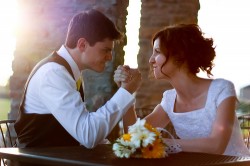So, we wake up and say to ourselves, “Hey, I’d like a lasting relationship.”
And then we sit up and look blankly around at the walls of the room, trying to let the eyes adjust to their re-function after eight hours of non-existence.
As imagery solidifies, the thoughts tumble in (as they are wont to do), and just to ourselves we think, sure, I see people in lasting relationships.
But—
Just because relationships are lasting doesn’t mean they’re happy. We don’t want that, because our idea of a good time is not being in a relationship that’s lasting only because it would be too hard to get out of.
Sure—there are circumstantial details of lasting relationships that seem almost contractual: the children, the finances, the acquisitions—making it seem like it would be absolutely impossible to think of life without this person, even if we don’t like them much.
But ultimately, if we can live through it, then it’s possible. And if we can’t live through it, then it’s possible up until a certain point and then it won’t matter anymore (…because we’re dead).
So, we don’t get any slack on that—we can have mediocre relationships our entire lives, but we don’t need to, and this is what we need to talk about.
(Our morning bed-talk with ourselves has just gotten serious.)
We just want a lasting relationship that continues to feel good throughout the years. We don’t need to be together forever with this person, or get married, or whatever—we want fulfillment in the relationships we choose to keep around us.
It’s not that we want to stop fighting with our partners, or that we want to be able to spend every single minute with a person without getting annoyed. We don’t want something that never changes, and we don’t want something that has no road blocks.
The absolute only thing we want is someone who shares a similar understanding of love.
Of course we know this is loose logic, for I am the only one who knows what love feels like to me, and you are the only one who knows what love feels like to you. There is currently no way to measure the similarity of those two understandings, which makes us so privileged to be able to feel exactly what we feel.
So even though we can’t exactly measure our understanding of love to our partners, that’s okay, because every other important aspect of our relationship will fall under that umbrella.
How we each define love determines how we communicate with ourselves and each other, what our values are and what our wants are.
This means we will eventually know (hopefully sooner than later) how our definitions play into each other.
This doesn’t mean that we can’t fight—we can still fight. We can still have emotional snafus that turn into miscommunication. We can have moments of separateness. We can have any of that stuff and be totally okay with it, but only if our partners have a similar understanding of love.
This is why all of our exes are exes. This is what they all have in common—at a certain point, we stopped understanding love the same way (perhaps we never did).
And now we realize that we could have saved ourselves a lot of time in this world if we had ever really asked how love felt inside of them. Or we did ask and then we stopped at some point.
Maybe we didn’t ask because we were scared that starting that conversation would be the start of breaking up (which happened anyway, because it was always going to happen). Maybe we stopped asking because of our tendency to make assumptions that we can actually know people (or even know ourselves), and so at a certain point we stopped having real conversations with each other because all we were doing was upholding an idea of who they were.
This is true of all of us: we will all take care of our relationships how we want to, and how we want to is determined by what we feel to be true about love.
If we define love as a messy, grunty battlefield, then we will have a relationship where our friends facetiously paste  No Glass Allowed signs on the front door of our building. But if we really love this person and they really love us back, and this is what our definition of love is all about, then we will probably stick around with each other.
No Glass Allowed signs on the front door of our building. But if we really love this person and they really love us back, and this is what our definition of love is all about, then we will probably stick around with each other.
We need to feel love reciprocally between each other. The reciprocity is the fuel that keeps it moving.
It doesn’t matter how love looks, as long as love is felt between each other.
The definition might split if one person decides, well, actually, no—I don’t think love is a battlefield anymore. With two conflicting understandings, we find ourselves unable to accept the given circumstances of the relationship. We become discontent with the relationship as it is, as we are no longer reciprocating love between each other.
Instead, we are tacitly demanding that the other person change their understanding of love to more accommodate us.
Without the cyclical exchange of love between us—given and received thousands of times over—we experience the misfiring of our offering, like throwing darts in the dark, and we watch our energy zip every which way around the room except into the heart of our partner.
We can feel this when it happens. Our partner can, too. And if we’re feeling this and we aren’t talking about it, then we will stay in this relationship unhappily (until we decide not to anymore).
Honesty is really the best policy: anything else is a waste of time.
And if this topic sometimes scares us to think about or talk about: that’s okay. Love is high stakes for us, and we really don’t want to mess it up. Or maybe we feel like we have already messed it up, and there’s nothing to do about it.
But if we allow those thoughts to clear out into stillness, we realize that everything’s okay: something is only messed up if we say it is. We don’t need to be afraid of anything.
So, without fear, we think: before we start with our partner, let’s start with ourselves: what is my definition of love?
The walls are sharply focused now, as we sit perked up in bed. It’s been a long time since we were this awake this early in the morning. Our minds focus to provide a definition that is both exact and vague at the same time, and as we say it to ourselves, we give ourselves the right to change our minds at any moment, just so we don’t feel pressured about the situation. Our definition rolls into the morning air:
Love is the most important thing. Whenever we think that something else is more important, cut that thought: love is the most important thing.
This sounds pretty good to us. (Or maybe it doesn’t, which is equally valid, in which case, we can just rewrite it to something that feels more fitting.)
 No matter what our definition is, we thank God for all the partners we’ve had who have agreed with that, and all the ones we’ve had who have not. In fact, because we’re thanking God right now, let’s go ahead and just give some thanks for the whole of life.
No matter what our definition is, we thank God for all the partners we’ve had who have agreed with that, and all the ones we’ve had who have not. In fact, because we’re thanking God right now, let’s go ahead and just give some thanks for the whole of life.
Let’s give thanks that we have the ability to let our definition of love be absolutely anything. We have the right to choose every moment of our lives.
Our love can feel so exquisite and full that we don’t even need something outside ourselves to give it to—we can let ourselves experience it in totality. We can receive from ourselves in the most abundant, glorious ways. We can be so flipping good to ourselves that getting a new car, a new haircut or a $70,000 bonus wouldn’t even feel as good as the way we treat ourselves.
The quality of love we give to ourselves is the quality of love we are able to offer others. If we don’t feel very abundant in our offering, maybe this means that we step outside of the relationship paradigm for a while to play around with how love feels when it is both given and received by only ourselves. Perhaps we use this time to play around with the whole of us–all our thoughts, our feelings and the energetic undercurrent inside of us that is always present Now–until our love feels (almost paradoxically) full and light.
If we find ourselves in times of aloneness rather than in relationship, it’s not sad. It is not something to be sorry for or avoided. Every moment we spend alone can be equally as treasured as the moments we swore we died and went to heaven (usually during the first bite of In-N-Out).
Being alone doesn’t mean that we can’t have lasting relationships, because our primary relationship will always be here as long as we are alive: the relationship between us and ourselves.
It dawns on us, as we finish this morning contemplation, that no matter what we choose we will always be okay, because our love is available to us at any moment: from ourselves, our partners and everything that anyone has named God.
As we sit here alone, we say one final thank you. This time we pray to God, to ourselves and to every single partner of every single person (which is everybody).
Love elephant and want to go steady?
Sign up for our (curated) daily and weekly newsletters!
Editor: Catherine Monkman
Photo: Elizabeth Smith/Pixoto, Sara Crolick/elephant archives, no lurvin here./Flickr

 Share on bsky
Share on bsky





Read 2 comments and reply